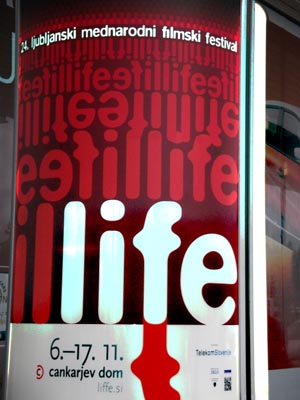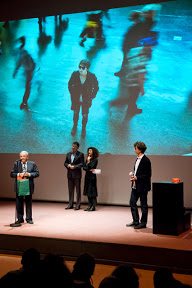|
|
||
|
Pro Tools
FILMFESTIVALS | 24/7 world wide coverageWelcome ! Enjoy the best of both worlds: Film & Festival News, exploring the best of the film festivals community. Launched in 1995, relentlessly connecting films to festivals, documenting and promoting festivals worldwide. Working on an upgrade soon. For collaboration, editorial contributions, or publicity, please send us an email here. User login |
Great September in Belgrade-Žilnik Strikes AgainAnother exciting event of September at the most popular art cinema in Belgrade Serbia, Dom Omladine is most definitely retrospective of Želimir Žilnik films that is ongoing and it will be over Sunday night. Žilnik’s retrospective started Wednesday night with gala opening of his brand new documentary One Woman One Century about glorious life of Istran woman Dragica Vitolović Srzentić: a great partisan woman warrior against II World War Fascism and later on a prisoner of Tito in 60s. One Woman One Century is a power documentary about history’s double coin, about woman who bravely fought the II War, Srzentić, next to the most well known, greatest and bravest partisans from the old Kingdom of Yugoslavia from the very beginning of 30s to the very end of the II World War. It is a powerful testimony about the contradiction of Josip Broz Tito and communist regime: Tito being warrior and hero of II World War and the very same Tito- the black and white crueler ruler of the regime in a peace of communist Socialist Federal Republic of Yugoslavia. Dragica Vitolović Srzentić was sent by Tito from island Vis to London, in private jet at the very end of Second World War 1945 to report to the world about great victory of Yugoslavian people against Hitler and Fascism and to Moscow 1948 to deliver the great NO to Russians. And later on to be sent, by the very same man to a prison for ten years of hard labor and regular beatings for telling only one thing in her private life: That Tito lies! A great gala ceremony of Dom Omladine closed the visit and a great bow of Dragica Vitolović Srzentić in person. This is truly fascinating story directed by Serbian black wave film director of living contradiction Želimir Žilnik about picture of one century long life of woman hero where Zilnik managed to open rarely mentioned segments of ex Yugoslavian intellectual and ideological maze of a great historical fall of 8 countries in 100 years period of time: Austro-Hungarian, Kingdom of Italy, Kingdom of Yugoslavia, Socialist Federal Republic of Yugoslavia, Serbia and Croatia. One Woman One Century ends gloriously with Italian guerilla song Bella Ciao sung by the left wing anti fascist resistance movement in Italy: a movement composed by Italian anarchist, communists and anti fascist partisans to color the fantastic life of our protagonist Dragica Vitolović Srzentić born in Istria, now part of Croatia. Istria was during the II World War part of Italy and Istrians were partly Italians at the time, but undeniably anti fascist during the II World War. The author of the lyrics is unknown to the world, and the music seems to come from an earlier folk inheritance of post II World War socialistic Italians. “Una mattina mi sono svegliato, (Stamattina mi sono alzato) o bella, ciao! bella, ciao! bella, ciao, ciao, ciao! Una mattina mi sono svegliato, (Stamattina mi sono alzato) e ho trovato l'invasor. O partigiano, portami via, o bella, ciao! bella, ciao! bella, ciao, ciao, ciao! O partigiano, portami via, ché mi sento di morir. E se io muoio da partigiano, (E se io muoio sulla montagna) o bella, ciao! bella, ciao! bella, ciao, ciao, ciao! E se io muoio da partigiano, (E se io muoio sulla montagna) tu mi devi seppellir…. “This is the most powerful documentary I have seen for a very long time now. LOL!!!! Freedom Costs A LotThe Yugoslav Black Wave in Film So who is Želimir Žilnik, you may ask? In addition, what is black wave in old Yugoslav Film? Želimir Žilnik is Serbian film director (born in Nazi concentration camp in 1942) that in 1969 beat Midnight Cowboy in Berlin with his very first feature film, Early Works, 1969 and won the Golden Bear. As one of the represent or of so called black wave in film of old Yugoslavia, Želimir has been attacked many times by the communist eminences of a communist Yugoslavian establishment, and until to very day he remained faithful to his creative poetry and social criticism and kept on to be very productive in spite of the historical changes in recent history. Once and nowadays very popular among Yugoslav liberal audience he directed films such as Pretty Women Walking Through the City, 1985 or How Steel Was Tempered, 1988. He has got the attention of the critics with his very provocative Marble Ass, 1995 and Wanderlust, 1998, while films such as Brooklyn-Gusinje, 1988 made also a great impact. Not to mention excellent documentaries and short films, as Seven Hungarian Ballads, 1978 and Fortress Europe, 2000 that I am off to see tonight. Together with his black wave colleague Dušan Makavejev he kept on to provoke once again, in order to force the very best. One part of the profession of being a film director is being aware of entire atmosphere or climate in the society and obvious changes. “We recognized and followed a time of major changes in systems and ideologies all over the world. However, I would not say that I am a representative of the '69 generation because I had made many provocative short films before it as well. I started in the mid sixties—the time when Yugoslavia and Tito's system were at their prime,” said Zilnik nowadays. His generation, which is the post World War II generation was one generation who intended to change the communist system entirely and alter the filmmaking system due to previous generations of dogmatic filmmakers within their structure and black and white presenters of II World War that integrated a lot of limitations of all kind and created frustration inside the leading structure at that time. The black wave were interested in showing in films something that were not normlly shown, such as ruins of the buildings, decaying objects or marginal people in opposite and counter the mythological communist ideology depiction of the partisan war hero in a classical Yugoslav cinema at that period. To remain for those who do not know, old Yugoslav black wave in film, on territory of all ex Yugoslav countries are actual films made in old Yugoslavia forbidden by communist government because of the content that may harshly made an indirect or direct impact critic on communist society? Žilnik belongs to generation of black wave film directors and same thematic group that went beyond with their extraordinary political polemics, but with very sarcastic and impeccable characters. His critical ways and irony tacked untouchable Josip Broz Tito and great communist establishment of 60s and 70s and 80s in old Yougoslavia. Black wave in film marked fantastically great student demonstrations against Broz in 1968, the Warshav Pact invasion of Czechoslovakia in 1968 and ended with arrest of Lazar Stojanović student leader and film director from Belgrade in 1975. Many of black wave film directors immigrated to Western countries right after that. But not Žilnik! Želimir Žilnik stayed on in country. Today Želimir is impressed by films of Italian neorealist and the American underground movement as an opponent of Hollywood clichés and still rolls on impeccably. His latest 2 films again, in more democratic society in nowadays by now provoked a lot of attention too: The Old School of Capitalism about poor factory workers who remain without jobs and possibility to find one in Vojvodina and One Woman One Century, a great documentary about rise and fall of Tito’s Socialist Federal Republic of Yugoslavia.
30.09.2011 | Radmila Djurica's blog Cat. : Arrest Author Belgrade Bella ciao Bella Ciao Berlin Ciao Cinema of Serbia Critic Croatia Diplomatic Relations DOM Dragica Vitolović Srzentić Early Works Early Works Entertainment Entertainment Europe film director Fortress Europe Hitler Istria Italian Resistance Italy Josip Broz Tito Josip Broz Tito Lazar Stojanović leader and film director London Major Marble Ass Moscow Nazi Person Attributes Person Career Person Location Private representative Serbia Serbian Independent Film Seven Hungarian Ballads Social Issues Social Issues Socialist Federal Republic of Yugoslavia The Old School of Capitalism Vis Yugoslav Black Wave Yugoslav partisans Želimir Žilnik Želimir Žilnik Independent
|
LinksThe Bulletin Board > The Bulletin Board Blog Following News Interview with IFTA Chairman (AFM)
Interview with Cannes Marche du Film Director
Filmfestivals.com dailies live coverage from > Live from India
Useful links for the indies: > Big files transfer
+ SUBSCRIBE to the weekly Newsletter Deals+ Special offers and discounts from filmfestivals.com Selected fun offers
> Bonus Casino
User imagesAbout Radmila DjuricaThe EditorUser contributions |





























